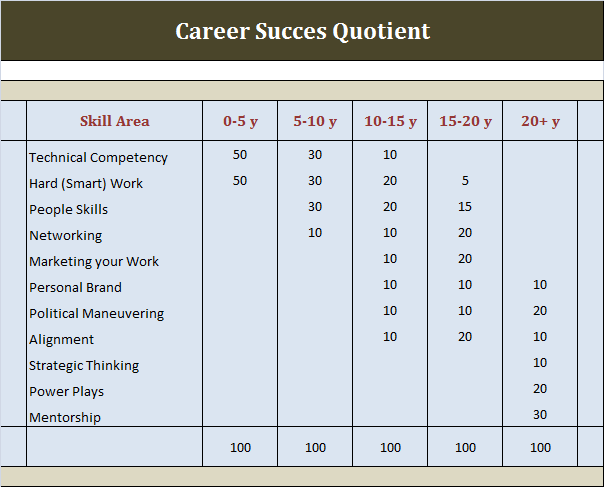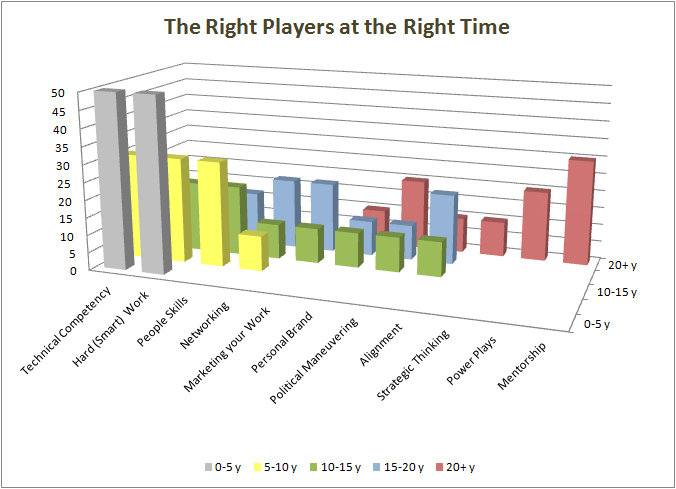“If at first you don’t succeed, try, try again. Then quit. No use being a damn fool about it.” -W. C. Fields
“I am very good at my job and work very hard, but my manager promoted Srinivas. He doesn’t have good technical skills. He only talks and flatters my manager. But all these companies are like this. They don’t recognize hard working people like me.”
“There is too much politicking in my company. Here people only survive by aligning with their bosses. I hate it that the main focus is alignment and not results. It is very difficult to get ahead without political maneuvering. But I don’t like politics and I can never be like my coworkers.”
“I work at a multinational corporation. My manager, and the other people in my team should recognize my good work. But here it is all about networking skills and marketing yourself. My networking skills are not great and I don’t like to boast. Why should I have to market my work if it’s good?”
Do you have a story like this? I’m sure you do and know of many others who do too. Although selecting an addictive career and knowing your strengths are fundamental, they alone aren’t sufficient to win the corporate game. Actually, most people have no idea what will be required of them, especially when they are just starting their careers. When I entered the corporate sector I certainly had no clue what I needed to do in order to be successful and continue to rise within my organization. I was told, and I believed, that if I had good “technical” skills and was hard-working then I would “grow” easily.
This was indeed the case for the first few years. Afterwards I learnt that this wasn’t enough and I needed to have team management skills as well. Fast forward a couple more years, I was told that I needed to “align” with the right people, “sell” my work, etc. Then came the need for networking and politics, and finally, power plays. None of these are inherently good or bad. Like it or not, these are just the essential skills you have to learn if you want to win the game.
Let me use the game of cricket as an analogy here. You need 11 players to play and each of those 11 players are crucial to forming a winning team. Similarly, in the game of careers, there are 11 key players:
- Technical competency
- Hard work
- People skills
- Networking
- Marketing your work
- Personal Branding
- Politicking
- Alignment
- Mentorship
- Strategic thinking
- Power plays
Just like in cricket, your players need to be carefully selected for pitch conditions. But what could be the pitch conditions of your corporate career? Among other individual factors, they are your corporate sector, company culture, job title, seniority and level of experience in the corporate world. How do you calculate your score at any stage of the game? This is where what I call the Career Success Quotient (CSQ) comes in. Your CSQ is quite simply your score as a percentage of the maximum, winning CSQ score of 100. The closer you get to 100, the better are your chances of winning at your career.

It is all actually very simple. Let me explain. Say you are 5 years in, in your career. In those early years, what is required and expected in any field is technical competency and the ability to work hard to deliver results. So each of those factors have a 50% weight towards the total score of 100. Depending on how good you are at your job and how hard you are working, you can know your score. Life is very easy right? Now let us assume that you have 5-10 years of experience. You will be expected to be good at a few more things like people management and networking. So the overall score gets distributed across these four factors based on importance.
Slowly, the interesting parts of the game begin. Observe how the relative weightage changes in the table above once you are in the 10- 15 years and 15-20 years brackets. The game becomes much more complex. You need to have the ability to market your work, build a personal brand (people need to know who you are), and manage internal politics. Most importantly, you need to “align” with your boss, your boss’s boss and with the culture of the organization in general.
The game changes even more radically when you get to the senior- most positions. It becomes very intense because the talents that are required are rare and not everyone can play the game at this level. That’s why very few can get to the top. Did you know notice the 180 degree shift as you went along from the start to the end, in terms of what is required to win? Don’t look at any of these factors- whether alignment, politics or power plays- in the negative shade. This is just how things work on the ground.

In every field, even ones as distinct as sports, entertainment, politics, and business, there are different kinds of players (talents) required, based on the pitch and the stage of the game. The framework I’ve presented to you is not meant to be an exact science. Don’t worry too much about how to score yourself- just use it as a rough guide. You will have to come up with a suitable CSQ table for your career and derive your score. What are the benefits of putting all this work in to calculate your CSQ? Put simply, it will give you your career astrology. You will know why you are growing or not growing.
But not everyone has the focus, talents or insights required to win. In fact, few people actually care about the game beyond a certain stage of financial security. It all comes down to your own individual biology, psychology and philosophy of life. Nonetheless, I hope you get some clarity from your score.

